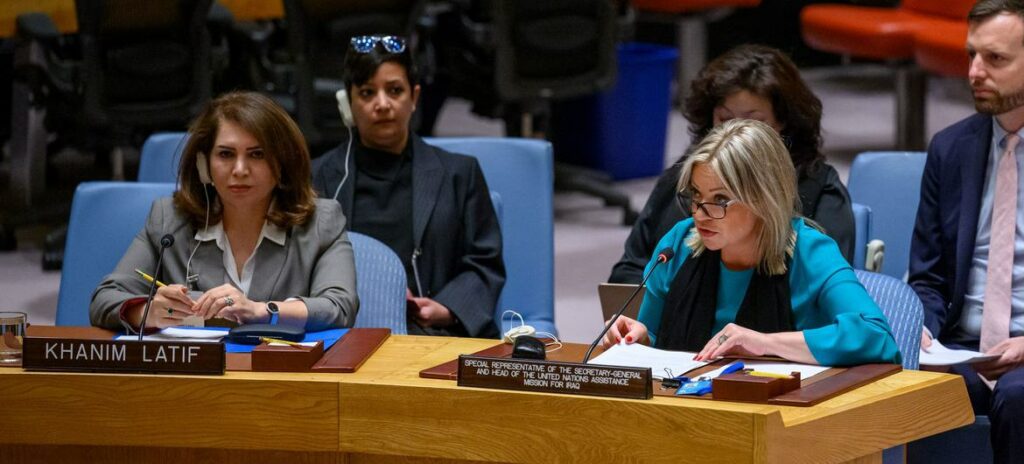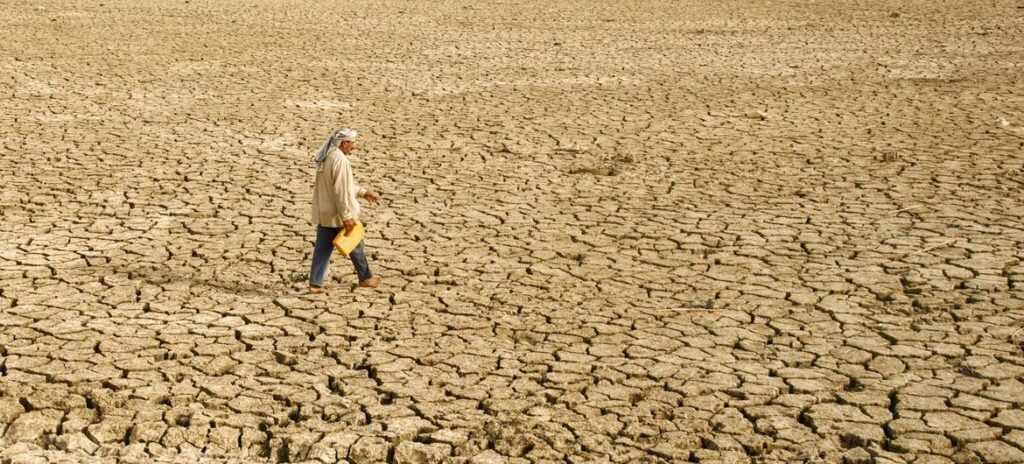
Despite gains, Iraq has not yet ‘turned the corner’, Security Council hears
UN Photo/Loey Felipe: Jeanine Hennis-Plasschaert (right), Special Representative of the Secretary-General and Head of the UN Assistance Mission for Iraq, briefs Security Council members on the situation in the country.
Iraq’s stability and hard-won gains require robust support amid concerns of shrinking civic space, postponed elections, and an unfolding climate emergency, the top UN official in the country told the Security Council on Thursday.
United Nations, 18 May 2023
“Now is not the time to be complacent, or to take for granted that Iraq has turned a corner,” said the UN Special Representative for Iraq Jeanine Hennis-Plasschaert.
Achievements range from fighting corruption to advancing energy independence, said Ms. Hennis-Plasschaert, who also heads the UN Assistance Mission for Iraq (UNAMI), briefing on recent developments.
But going forward, she said, critical actions must tackle outstanding issues, including forging an agreement on a functioning budget and ensure the long-awaited provincial council elections occur by the end of 2023.

Baghdad-Erbil nearing brink
Turning to the Kurdistan region, she said disagreements between the two ruling parties in recent months drove the region “close to the brink” amid an increasingly reckless and irresponsible political situation.
Among a range of concerns, she raised the issue of the long-overdue parliamentary elections.
“Time is of the essence,” she said, adding that agreement on outstanding electoral issues must urgently be found. “Another postponement would be detrimental to public trust.”
Rise in tensions
Despite repeated declarations of commitment from Baghdad and Erbil, she remained disappointed over the scant progress made so far, in implementing the 2020 Sinjar Agreement, which outlined a road map for reconstructing the north of the country.
“Such stagnation creates further space for spoilers to exploit the situation to their own ends, and it blocks thousands of displaced Sinjaris from returning to their areas of origin,” she said.
A recent rise in tensions between communities in Sinjar was in large part further fuelled by online disinformation targeting the Yazidi community.
While local leaders from all sides have collectively worked to dispel this spike in tensions, she said, challenges to reconciliation will persist until meaningful steps are taken, including those towards a unified administration, stable security structures and reconstruction.
Be it the budget, questions surrounding hydrocarbon resources, disputed territories, the implementation of the Sinjar Agreement, or any other outstanding issue for that matter, she said it remains essential to move beyond ad hoc engagements between Baghdad and Erbil.

Climate emergency
Water represents the most critical climate emergency for Iraq. By 2035, it is estimated that Iraq will have the capacity to meet only 15 per cent of its water demands. Around 90 per cent of Iraq’s rivers are polluted, and seven million people are currently suffering from reduced access to water. This is a significant multiplier of threats to Iraq’s stability.
Welcoming the priority placed on the issue of water security by Iraq’s Government, she said plans for the extensive updating of water management systems are said to be underway, which will be vital in meeting demands driven by population growth and urbanization.
Scaling up diplomacy
“The fair sharing of resources among Iraq’s neighbours is equally important,” she said. If water access becomes a competition, everyone loses; bold domestic actions and close regional cooperation offer the only winning solution.
Regional security, economic and political developments will continue to impact Iraq, she said, emphasizing that the importance of the Government’s efforts to scale up diplomacy with and among its neighbours in a number of areas, from border security and trade to water-sharing and climate issues.
Shrinking civic space
Underlining the need for active, empowered and protected civic space, she expressed hope that Iraq’s leaders and authorities publicly embrace civic engagement, and the freedom of expression at that, to avoid fomenting a renewed sense of isolation and disillusion among Iraqi people, particularly the younger generation and women.
“Accountability, rule of law, and respect for human rights are equally essential to preventing recurring cycles of crises,” she said.
Kuwaiti concerns
Turning to the issue of missing Kuwaiti and third-party nationals and of Kuwaiti property as a result of Iraq’s short-lived invasion of the country in 1990, she noted progress in locating witnesses and possible burial sites and welcomed welcome the Prime Minister’s decision to establish a committee to continue these efforts.
However, she said her Officer continues to await progress on the retrieval of missing Kuwaiti property, including the national archives.
Fragile gains
These gains “could be easily spoiled”, whether through unchecked corruption, interference from within, intrusion from the outside, a groundswell of disillusion or political horse-trading against the common good, she said.
“Iraq has tremendous potential,” she said. “Through ambitious Government plans, provided they are fully implemented, many drivers of instability can be addressed.”
The article originally appeared here.